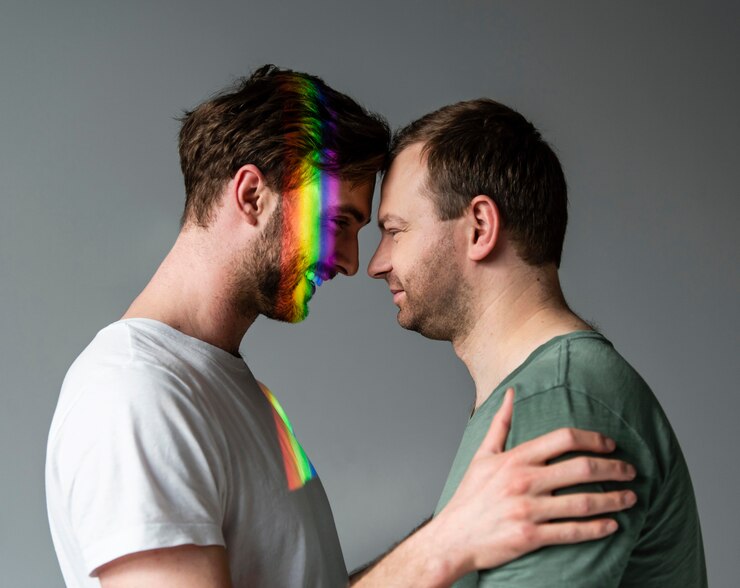How to Navigate Libido and Intimacy Issues in LGBTQ+ Relationships

Understanding the Complexity of Libido and Intimacy in LGBTQ+ Relationships

Libido and intimacy are integral aspects of any relationship, and understanding their complexity becomes even more crucial in LGBTQ+ relationships. However, it is important to recognize that there is no one-size-fits-all approach when it comes to exploring and nurturing these elements. Factors such as gender identity, sexual orientation, cultural backgrounds, and personal experiences can all significantly influence the expression of libido and intimacy within LGBTQ+ relationships.
Moreover, societal expectations can exert a profound impact on how individuals perceive and engage with their libido and intimacy. The ongoing stigma and discrimination faced by LGBTQ+ communities can result in internalized shame or guilt, making it challenging for individuals to fully embrace and explore their sexual desires. Therefore, creating a safe and inclusive space within relationships is essential, where open and honest communication about sexual needs and desires can take place without fear of judgment or rejection.
In conclusion, understanding the complexity of libido and intimacy in LGBTQ+ relationships requires a sensitive and nuanced approach. By acknowledging the impact of societal expectations and fostering open communication, couples can navigate these aspects with empathy and respect. By doing so, they can build a strong foundation of trust and create a space where their individual desires and boundaries are validated and respected. Empowering LGBTQ+ relationships in matters of libido and intimacy not only strengthens the connection between partners but also contributes to creating a more inclusive and accepting society.
Recognizing the Impact of Societal Expectations on Libido and Intimacy

Societal expectations play a significant role in shaping our attitudes and behaviors, and this is no different when it comes to libido and intimacy in LGBTQ+ relationships. These expectations can often create a sense of pressure and anxiety, as individuals may feel the need to conform to certain norms or ideals. For example, society may prescribe specific gender roles or expectations regarding sexual performance that may not align with the sexual desires or preferences of LGBTQ+ individuals.
Moreover, societal expectations can also contribute to feelings of shame or guilt surrounding one’s own sexuality. LGBTQ+ individuals may face stigmatization, discrimination, or lack of acceptance from their families, friends, or broader communities. As a result, they may internalize these negative messages, leading to a diminished sense of self-worth or difficulty embracing their own sexual desires.
It is vital to recognize and challenge these societal expectations to foster a healthier understanding and expression of libido and intimacy in LGBTQ+ relationships. By acknowledging these external pressures, individuals can begin to separate themselves from societal norms and embrace their unique sexual identities and desires. This recognition can empower individuals to communicate openly and honestly with their partners about their needs and boundaries, ultimately leading to a more fulfilling and satisfying sexual relationship.
• Societal expectations can create pressure and anxiety in LGBTQ+ relationships
• Prescribed gender roles and sexual performance norms may not align with individual desires
• Stigmatization, discrimination, and lack of acceptance contribute to shame or guilt surrounding sexuality
• Negative messages can lead to diminished self-worth and difficulty embracing sexual desires
• Challenging societal expectations is crucial for fostering a healthier understanding of libido and intimacy in LGBTQ+ relationships
• Recognizing external pressures allows individuals to separate themselves from societal norms
• Embracing unique sexual identities and desires empowers individuals to communicate openly with partners
• Open communication leads to more fulfilling and satisfying sexual relationships.
Communicating Openly and Honestly about Sexual Desires

Open and honest communication about sexual desires is essential in any relationship, but it takes on an even greater significance in LGBTQ+ relationships. Due to societal stigmatization and limited representation, many LGBTQ+ individuals face unique challenges when it comes to expressing their sexual desires. This can make it difficult for partners to fully understand and fulfill each other’s needs.
To navigate these challenges, it is important to establish an environment of trust and safety where open communication can thrive. Start by creating a judgment-free space where both partners feel comfortable discussing their desires and fantasies. This may involve setting aside dedicated time for conversations about sex and intimacy, ensuring that both partners have equal opportunity to speak and be heard.
In addition to verbal communication, non-verbal cues and body language can also play a crucial role in understanding and conveying sexual desires. Pay attention to your partner’s reactions, both verbal and non-verbal, during intimate moments. Encourage open and honest feedback, and be receptive to your partner’s words and gestures. This can enhance mutual understanding and help ensure that both partners’ desires are respected and fulfilled.
Exploring the Role of Emotional Connection in LGBTQ+ Intimacy
Building a strong emotional connection is paramount to cultivating intimacy in LGBTQ+ relationships. Emotional connection goes beyond physical attraction and sexual desire, as it involves a deep understanding and acceptance of each other’s emotions, thoughts, and experiences. When partners establish a solid emotional bond, it creates a safe space for vulnerability, trust, and compassion.
In LGBTQ+ relationships, emotional connection often plays a crucial role in navigating the challenges and unique experiences faced by individuals within the community. It allows partners to empathize and validate each other’s feelings, fostering a sense of belonging and support. Moreover, a strong emotional connection can enhance communication, allowing partners to openly express their needs, desires, and boundaries, ultimately leading to a more fulfilling and satisfying intimate connection. Taking the time to cultivate emotional connection through meaningful conversations, shared experiences, and active listening can lay a solid foundation for a thriving and intimate LGBTQ+ relationship.
Nurturing Trust and Safety within LGBTQ+ Relationships
Creating a nurturing and safe environment is crucial for fostering trust within LGBTQ+ relationships. Trust serves as the foundation for emotional and physical intimacy, enabling individuals to feel secure and comfortable in expressing their needs and desires. To nurture trust within a LGBTQ+ relationship, open and honest communication is key. Couples should establish a safe space where they can openly discuss their feelings, fears, and boundaries. This may involve setting aside dedicated time for regular check-ins, or even seeking the guidance of a therapist or counselor who specializes in LGBTQ+ relationships. By prioritizing open and honest communication, individuals can build trust and develop a deeper connection with their partner.
Additionally, it is important to respect and validate each other’s boundaries and preferences. Every individual has their own unique set of boundaries and comfort levels, and these should be acknowledged and respected within a LGBTQ+ relationship. This includes sexual boundaries, emotional boundaries, and personal boundaries. Respect for boundaries ensures that both partners feel safe and heard, fostering an environment of trust and safety. Couples can work together to navigate these boundaries, finding a balance that promotes mutual satisfaction and fulfillment. By nurturing trust, respect, and communication, individuals can cultivate a strong foundation within their LGBTQ+ relationship, enhancing intimacy and connection.
Certainly! Here’s information on nurturing trust and safety within LGBTQ+ relationships presented in a table format:
| Nurturing Trust and Safety in LGBTQ+ Relationships | Key Considerations |
|---|---|
| Open Communication | – Regularly communicate openly about feelings, needs, and expectations. |
| – Establish a safe space for discussing personal and relationship concerns. | |
| Respect for Identity and Individuality | – Honor and respect each other’s unique identities and individuality. |
| – Foster an environment that celebrates diversity and personal growth. | |
| Building Emotional Intimacy | – Share emotions and vulnerabilities to deepen emotional connection. |
| – Prioritize quality time together to strengthen the emotional bond. | |
| Affirmation and Support | – Offer affirmations and support for each other’s goals and aspirations. |
| – Create a sense of belonging by acknowledging and celebrating achievements. | |
| Establishing Boundaries | – Clearly define and respect each other’s personal boundaries. |
| – Discuss and negotiate boundaries to ensure mutual understanding. | |
| Conflict Resolution Skills | – Develop healthy conflict resolution strategies to address disagreements. |
| – Prioritize understanding and compromise during conflicts. | |
| Cultural Sensitivity and Awareness | – Acknowledge and respect each other’s cultural backgrounds and experiences. |
| – Educate yourselves on LGBTQ+ history, challenges, and milestones. | |
| Promoting Safety and Well-being | – Prioritize physical and emotional safety in the relationship. |
| – Support each other’s mental health and well-being. | |
| Community Involvement | – Engage with the LGBTQ+ community for support and shared experiences. |
| – Attend LGBTQ+ events, workshops, or support groups together. | |
| Shared Values and Future Planning | – Discuss shared values, long-term goals, and future plans. |
| – Collaborate on building a future that aligns with both partners’ aspirations. | |
| Celebrating Relationship Milestones | – Acknowledge and celebrate relationship milestones and anniversaries. |
| – Use these occasions to express gratitude and reaffirm commitment. | |
| Educating Allies and Promoting Inclusivity | – Educate friends and family about LGBTQ+ issues and the importance of inclusivity. |
| – Foster a supportive network of allies to create a broader sense of community. | |
| Seeking Professional Support | – Consider seeking guidance from LGBTQ+ affirming therapists or counselors. |
| – Utilize professional resources for navigating unique challenges. |
Addressing Power Dynamics and Consent in LGBTQ+ Intimacy
Power dynamics and consent play a crucial role in LGBTQ+ intimacy, just as they do in any relationship. It is important to address these factors to ensure that all partners feel safe, respected, and equal in their sexual encounters.
Negotiating power dynamics involves acknowledging and challenging societal norms and expectations that may affect how power is distributed within a relationship. This can include examining gender roles, stereotypes, and assumptions about sexual preferences and behaviors. Open communication is key in addressing power imbalances and establishing consent. It is essential for partners to engage in ongoing, honest conversations about their desires, boundaries, and comfort levels. This communication should be non-judgmental and free of coercion, allowing each individual to express their needs and preferences without fear of judgment or negative consequences. Consent is an ongoing process that should be obtained and reaffirmed throughout sexual encounters, ensuring that all acts are agreed upon and enthusiastic from all parties involved. It is important to emphasize that consent is not just the absence of a “no,” but the presence of a clear and enthusiastic “yes.” Addressing power dynamics and obtaining consent can help create a healthy and mutually satisfying sexual experience for all partners in an LGBTQ+ relationship.
Validating and Respecting Individual Boundaries and Preferences
Establishing and respecting boundaries is a crucial aspect of any healthy and fulfilling relationship, particularly when it comes to intimacy. In LGBTQ+ relationships, understanding and validating individual boundaries and preferences takes on added significance. Recognizing that each person has their own unique set of boundaries and desires is essential for fostering a safe and inclusive space for intimacy to thrive.
To validate and respect individual boundaries and preferences, open and honest communication is key. Create an environment where both partners feel comfortable discussing their needs and desires without judgment or pressure. This can involve setting aside dedicated time to have open conversations about boundaries, exploring different comfort levels, and actively listening to one another’s concerns. By offering each other empathy, understanding, and validation, you create a foundation for trust and respect within your relationship. This also encourages an ongoing dialogue, allowing both partners to adjust and renegotiate boundaries as needed. Remember, consent is an ongoing process, and it is important to continuously check in and ensure that both partners are comfortable and enthusiastic participants in any intimate activity.
Seeking Professional Help and Support for Libido and Intimacy Issues
Professional Help and Support for Libido and Intimacy Issues can be vital for individuals in LGBTQ+ relationships facing challenges in their sexual and romantic lives. When concerns arise regarding libido, desire, or intimacy, seeking assistance from a qualified professional can provide valuable insights, guidance, and support.
It is important to consider finding a healthcare professional who specializes in LGBTQ+ health or sexual and reproductive medicine. These professionals have an understanding of the unique issues that LGBTQ+ individuals may face and can offer tailored guidance and treatment options based on their expertise. They can help individuals navigate the complexities of libido and intimacy, identify any underlying physiological or psychological factors, and develop personalized strategies to address these concerns.
In addition to medical professionals, individuals seeking support may also benefit from working with therapists or counselors who are knowledgeable and affirming of LGBTQ+ experiences. These professionals can provide a safe and nonjudgmental space to explore the emotional and psychological factors that may be impacting libido and intimacy, such as past traumas, relationship dynamics, or internalized shame or stigma. With their expertise, they can guide individuals in building healthier communication skills, enhancing emotional connections, and addressing any mental health concerns that may be impacting intimacy.
Professional help and support can be a valuable resource for individuals in LGBTQ+ relationships seeking to address libido and intimacy issues. By working with knowledgeable healthcare professionals and therapists who understand the unique complexities of LGBTQ+ experiences, individuals can gain insight into the underlying factors contributing to their concerns and develop strategies to enhance their sexual and romantic lives. It is important to recognize that seeking professional help is a proactive step towards self-care and can lead to greater satisfaction, fulfillment, and overall well-being.
Embracing Self-Exploration and Self-Care in LGBTQ+ Relationships
Self-exploration and self-care play crucial roles in nurturing healthy and fulfilling LGBTQ+ relationships. In the context of libido and intimacy, it is essential for individuals to understand their own desires, boundaries, and preferences. Engaging in self-exploration allows individuals to develop a sense of self-awareness and gain insights into their own needs and wants.
One way to embrace self-exploration is by taking the time to reflect on one’s own desires and preferences. This can involve exploring various forms of self-pleasure, such as masturbation, as a means to better understand one’s own body and sexual responses. Additionally, engaging in open and honest communication with one’s partner about sexual desires and fantasies can further contribute to self-exploration and create an opportunity for mutual understanding and shared experiences.
Self-care is also a vital aspect of embracing self-exploration in LGBTQ+ relationships. It involves prioritizing one’s physical and emotional well-being. Taking care of oneself through proper nutrition, regular exercise, and sufficient rest can positively influence both mental and physical aspects of sexual health. Furthermore, seeking professional help and support, such as therapy or counseling, can be beneficial in addressing any emotional or psychological challenges and promoting overall well-being. By investing in self-exploration and self-care, individuals can strengthen their relationship with themselves and enhance their ability to nurture intimacy and fulfill their sexual needs.
Discussing Medical and Hormonal Factors Affecting Libido in LGBTQ+ Individuals
The human body is a complex system, and various medical and hormonal factors can influence libido in LGBTQ+ individuals. It is important to understand that each person’s experience is unique, and there is no one-size-fits-all approach when it comes to discussing these factors. However, certain aspects can be considered when examining the potential impact on libido.
One factor that may affect libido is hormone levels. Hormones play a crucial role in sexual desire and functioning. For instance, testosterone is often associated with libido in both cisgender men and transgender individuals assigned female at birth (AFAB). In cisgender women and transgender individuals assigned male at birth (AMAB), estrogen and progesterone can impact sexual desire. Hormonal imbalances, such as those caused by certain medical conditions or hormone therapy, may lead to changes in libido. It is important for individuals to discuss their hormone levels with their healthcare provider to better understand and address any potential concerns.
Additionally, certain medications can also influence libido. Some antidepressants, antipsychotics, and blood pressure medications have been associated with decreased sexual desire or difficulties with arousal and orgasm. It is essential for individuals to consult their healthcare provider if they notice any changes in libido while taking medication, as adjustments may be needed. Open communication with healthcare professionals can help identify potential solutions or alternatives to medication that may have a less pronounced impact on libido.
Understanding these medical and hormonal factors is crucial for LGBTQ+ individuals to achieve a satisfactory sexual experience. It is imperative for individuals to have open and honest conversations with their healthcare providers to assess and address any concerns regarding libido. By working together and utilizing advances in medical science, individuals can explore potential options and strategies to enhance sexual satisfaction and overall well-being.
Exploring Alternative Forms of Intimacy and Connection
Intimacy and connection in LGBTQ+ relationships can take on various forms beyond the traditional physical expressions. While sexual intimacy is an important aspect of many relationships, it is crucial to recognize that there are alternative ways to foster connection and build intimacy. These alternatives can be particularly valuable for individuals who experience challenges with libido or those who prefer non-sexual forms of intimacy.
One avenue to explore is emotional intimacy, which focuses on building a deep emotional connection with your partner. This can involve open and honest communication, active listening, and being attentive to each other’s emotional needs. Engaging in activities that promote emotional bonding, such as sharing personal experiences, engaging in deep conversations, or practicing mindfulness together, can help strengthen the emotional connection within the relationship. By prioritizing emotional intimacy, partners can cultivate trust, support, and understanding, ultimately deepening their connection and sense of intimacy.
Empowering LGBTQ+ Relationships through Education and Resources
Education and resources play a vital role in empowering LGBTQ+ relationships, helping individuals navigate the complexities of libido and intimacy. By providing comprehensive information and support, these tools enable couples to build a solid foundation for a fulfilling and satisfying intimate life.
One important aspect of education is debunking myths and misconceptions that may surround LGBTQ+ sexuality. It is crucial to provide accurate and unbiased information about sexual health, pleasure, and techniques that are inclusive of all sexual orientations and gender identities. This can be achieved through workshops, seminars, and online platforms that combine clinical expertise with empathy and understanding.
In addition to education, resources dedicated to LGBTQ+ relationships offer practical guidance and tools that can enhance intimacy. These resources may include books, podcasts, and online forums where couples can access information tailored to their specific needs. These materials can provide insights into communication techniques, intimacy-building exercises, and strategies for dealing with common challenges faced by LGBTQ+ couples. By equipping individuals with knowledge and skills, these resources empower them to overcome obstacles and create a thriving and mutually fulfilling intimate relationship.
Building Resilience and Patience in the Face of Libido and Intimacy Challenges
Resilience and patience are essential qualities to cultivate when facing challenges in libido and intimacy within LGBTQ+ relationships. It is crucial to acknowledge that variations in sexual desire and intimacy needs are common among individuals, regardless of their sexual orientation or gender identity. These differences can stem from a range of factors, including hormonal imbalances, stress levels, mental health concerns, or relationship dynamics.
Building resilience begins with fostering open and honest communication between partners. Creating a safe and non-judgmental space allows for the expression of desires, concerns, and boundaries. This open dialogue not only helps partners understand each other’s needs but also promotes a deeper emotional connection. It is essential to approach these conversations with empathy and a willingness to listen and validate each other’s experiences. Additionally, seeking professional help from therapists or sexologists experienced in LGBTQ+ issues can provide valuable guidance and support in navigating libido and intimacy challenges. By building this resilience and patience, individuals and couples can work towards a more fulfilling and satisfying sexual and emotional relationship.
In conclusion, Building resilience and patience in the face of libido and intimacy challenges within LGBTQ+ relationships is crucial for overall relationship satisfaction and well-being. Open and honest communication, seeking professional help, and understanding individual boundaries and preferences are vital steps in navigating these challenges. By embracing patience and resilience, individuals and couples can foster a stronger emotional connection and work towards finding solutions that meet both partners’ needs.
Fostering a Sex-Positive and Inclusive LGBTQ+ Community
Within the LGBTQ+ community, fostering a sex-positive and inclusive environment is crucial for the overall well-being and satisfaction of individuals and relationships. By creating a safe space where individuals can openly discuss their sexual desires, preferences, and needs, we can promote a healthier and more fulfilling sexual experience for all.
One key aspect of fostering a sex-positive and inclusive LGBTQ+ community is promoting education and awareness. Providing accurate and comprehensive information about sexual health, consent, and pleasure can help debunk myths and stereotypes that may perpetuate shame and stigma surrounding LGBTQ+ sexuality. Collaborating with healthcare professionals, sex educators, and community organizations can facilitate workshops, seminars, and online resources that address specific concerns and provide evidence-based information. Additionally, encouraging open dialogue and discussion about sexual experiences can help normalize LGBTQ+ sexuality and create a supportive community where individuals feel comfortable expressing their desires and seeking help when needed.
What are some factors that can impact libido and intimacy in LGBTQ+ relationships?
Factors such as societal expectations, communication barriers, emotional connection, power dynamics, individual boundaries and preferences, medical and hormonal factors, and the impact of stress and trauma can all influence libido and intimacy in LGBTQ+ relationships.
How can LGBTQ+ individuals communicate openly and honestly about their sexual desires?
LGBTQ+ individuals can foster open and honest communication about their sexual desires by creating a safe and non-judgmental space, actively listening to their partner, using clear and respectful language, expressing their needs and boundaries, and being receptive to feedback and dialogue.
What role does emotional connection play in LGBTQ+ intimacy?
Emotional connection is essential in LGBTQ+ intimacy as it builds trust, understanding, and a deeper level of intimacy. It allows individuals to feel safe, vulnerable, and connected, enhancing overall satisfaction and fulfillment in their relationships.
How can LGBTQ+ relationships address power dynamics and ensure consent in intimacy?
LGBTQ+ relationships should prioritize open discussions about power dynamics, ensuring consent, and establishing clear boundaries. Consent should be ongoing and enthusiastic, and individuals should actively seek and respect their partner’s boundaries and preferences.
How can LGBTQ+ individuals seek professional help and support for libido and intimacy issues?
LGBTQ+ individuals can seek professional help and support by reaching out to therapists or counselors who specialize in LGBTQ+ issues. They can also access LGBTQ+-friendly support groups, community organizations, or healthcare providers who are knowledgeable about the unique experiences and challenges faced by the community.
How can LGBTQ+ relationships embrace self-exploration and self-care?
LGBTQ+ relationships can embrace self-exploration and self-care by encouraging individuals to prioritize their own needs, engage in self-reflection, practice self-compassion, and explore their own desires and boundaries. This can involve activities such as self-pleasure, self-care routines, and engaging in personal growth and self-discovery.
What are some alternative forms of intimacy and connection in LGBTQ+ relationships?
Alternative forms of intimacy and connection in LGBTQ+ relationships can include non-sexual physical affection, emotional intimacy, intellectual connection, spiritual bonding, and acts of care and support. These forms of intimacy can be equally fulfilling and meaningful in fostering a strong and healthy relationship.
How can the LGBTQ+ community be empowered through education and resources?
The LGBTQ+ community can be empowered through education and resources by providing comprehensive and inclusive sex education, promoting awareness about LGBTQ+ relationships and issues, offering support groups and counseling services, and advocating for rights and equal representation.
How can LGBTQ+ individuals build resilience and patience when facing libido and intimacy challenges?
LGBTQ+ individuals can build resilience and patience by practicing self-compassion, seeking support from trusted individuals, staying open to learning and growth, utilizing coping strategies such as mindfulness or therapy, and acknowledging that challenges in libido and intimacy are common in all relationships.
How can a sex-positive and inclusive LGBTQ+ community be fostered?
A sex-positive and inclusive LGBTQ+ community can be fostered by promoting open dialogue, challenging stigmas and stereotypes, providing inclusive sexual education and resources, creating safe spaces for discussion and support, and advocating for policies and legislation that protect LGBTQ+ rights and equality.






